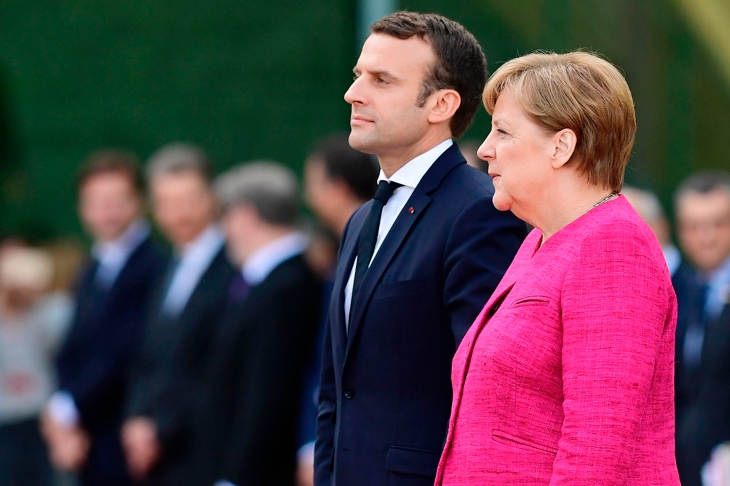Never mind Eurovision. For Germany, the state election in North Rhine Westphalia on Sunday was the big one – the best indication of how Germans will vote in their national election in four months time. The result was a ‘political earthquake’ according to German media – a humiliation for Martin Schulz’s Social Democrats, and a spectacular victory for Angela Merkel’s conservative CDU. For Merkel, a dead woman walking a year ago, September’s national election now looks like hers to lose. How did she manage this remarkable comeback? And what are the implications for Britain, and the EU?
Yesterday’s result may have taken German pundits by surprise, but Merkel’s support has been growing steadily for some time. After her political nadir in 2015, when she allowed a million refugees into Germany, she looked like a busted flush, losing a state election in Mecklenburg (her own back yard) to a resurgent SPD. However, as The Spectator predicted in January, Trump’s triumph gave her a way back, and she’s grabbed this opportunity with both hands.
Donald Trump’s victory was never going to persuade SPD die-hards to vote for Merkel, but it has encouraged disillusioned Christian Democrats to return home. Foreign policy has always been Merkel’s strongest suit, and the more perilous the international situation, the more powerful she appears. If Hillary had won, German voters would have been more inclined to take a chance on a new Chancellor. With Trump in the White House, it feels as if the time for protest votes has passed. For risk averse German voters, an unpredictable president requires a tried and trusted chancellor. Even her fiercest foes can’t dispute Merkel’s vast experience on the world stage.
Recent election results in Saarland and Schleswig Holstein confirmed this prediction. Merkel’s victories in these states were stronger than expected, but her victory in North Rhine Westphalia is on an entirely different scale. Saarland and Schleswig Holstein are relatively small – North Rhine Westphalia is huge. With 18 million inhabitants, it’s the most populous state in Germany (more populous than the Netherlands, or Austria and Switzerland combined). With its big urban conurbations, it’s always been an SPD stronghold – during the last fifty years, the CDU has only ruled this state for five years. Yet after yesterday’s election, the CDU is now the biggest party in the state, on 33pc (up 6.7pc), while the SPD fell back a whopping 7.9pc to 31.2pc. If Merkel can win here, in Germany’s rustbelt, she can win anywhere. No wonder SPD leader Martin Schulz called this ‘a stinging defeat’.
The performance of Germany’s smaller parties was also telling. Yet again, Germany’s new anti-immigration party, Alternative fur Deutschland, failed to match its 20pc showing in Mecklenburg last year. AfD polled 7.5pc, enough to give it 16 seats in the state parliament, but after similar results in Saarland and Schleswig Holstein, it’s increasingly clear that its only substantial support is in the east. Equally significant was the improved performance of the centre-right Free Democrats, who came third with 12.6pc (a gain of 4pc). From 2009 to 2013, the Free Democrats were the CDU’s coalition partners, but a rout in the 2013 election left them with less than 5pc of the vote – the minimum required for parliamentary representation. Dumped out of parliament, for the first time since the war, if the Free Democrats can replicate yesterday’s result on a national level in September, they could form another coalition with Merkel’s CDU, and leave the SPD out in the cold.
So what would a fourth term for Merkel mean for Britain, and for Brexit? Well, that all depends on whether she’s governing with the SPD or the FDP (under Germany’s parliamentary system, single party government is a virtual impossibility). Merkel’s ‘grand coalition’ with the SPD these last four years has been a clumsy compromise – an awkward alliance of conservatives and socialists. The FDP, conversely are classical liberals – left of Merkel’s CDU on social matters, yet economically more right wing. They’re also comparatively eurosceptic (by German standards, at least). A CDU-SPD coalition would be far more inflexible about Brexit. A CDU-FDP coalition would be more open-minded about doing deals that would help both sides.
Merkel will win this autumn – yesterday’s result makes that quite clear. The only question that remains is whether she wins big enough to form an alliance with the fiscally pragmatic FDP, or is forced to revive her unwieldy pact with the leftist SPD. British Brexiteers may not feel like rooting for a Merkel landslide in September, but a big win for her (which now seems a lot more likely) may well be the best outcome, for us and them.







Comments